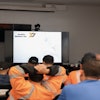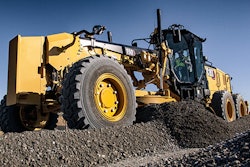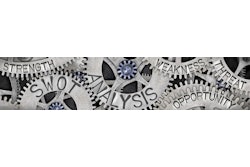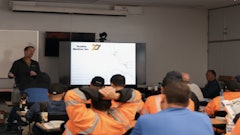
This blog was updated on 6/6/2023.
When budgets are tight or workloads are booming, training is often one of the first things to hit the chopping block. After all, when you take operators off the equipment and put them in a class or in front of the computer, they cost you money instead of earning you profits. But when you consider all the ways operator training pays dividends — both in reduced costs and increased productivity — can you really afford not to do it? Take a look at the benefits:
Less Chance of Accidents and Damage
The biggest benefit of training isn’t a financial one — it’s a human one. Trained operators work more safely, reducing the risk of accidents and injuries. Fewer accidents mean less downtime, costly equipment damage and money spent on insurance premiums.
Reduced Fuel Use and Costs
Production studies we’ve done at Caterpillar show a skilled operator can use 10-12% less fuel every day than an unskilled one. Trained operators understand proper machine use and jobsite setup, know when to run on economy mode versus full RPMs and don’t idle machines unnecessarily. Add up the numbers: If each of your operators used 10% less fuel a day, how much could you save over the course of a year?
More Work Done More Quickly
Operators who know how to get the most out of their machines move, dig, load and haul faster and more accurately — helping you meet deadlines and move on to the next project. A trained operator, for example, can shave three to four seconds off cycle times. On a typical jobsite, those few seconds can add up to big savings or significantly more tons moved per year.
Fewer Costly Errors and Rework
As long as humans operate machines, human error will be a factor. But training can reduce it. Consider a quarter-inch error in grade on a paving project. That doesn’t sound like much, but it could translate into an extra $10,000 spent on concrete. Trained operators are less likely to make errors that cause rework or misuse equipment in ways that lead to unscheduled downtime.
Savings on Parts and Maintenance
Trained operators don’t just operate machines more effectively; they also operate them less harshly. That means you get maximum life out of components — especially pricey items like tires and undercarriage — and spend less on parts, maintenance and service. Trained operators also know how to perform daily inspections and respond to machine alerts and warnings, two of the best ways to catch potential problems before they turn into costly repairs and downtime.
Better Use of Technology
How many of your machines feature built-in or optional technologies designed to reduce fuel consumption, improve accuracy or boost efficiency? Trained operators help you get the maximum return on your investment by using technologies to get to grade in fewer passes, achieve uniform compaction or hit target payload the first time and every time.
Don’t think you have to send operators away to classes (although that’s certainly an option). There’s plenty of great online training available in addition to on-the-job and in-the-simulator sessions.
This blog was updated on 6/6/2023.








![01 Health 600x400[1]](https://img.forconstructionpros.com/files/base/acbm/fcp/image/2020/08/01_Health_600x400_1_.5f3a9195123ae.5f3a91a7ea02f.png?auto=format%2Ccompress&fit=crop&h=167&q=70&rect=0%2C61%2C1251%2C703&w=250)











